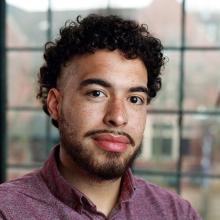2024 Dean’s Early Career Research Awards
By Aubrey Christofersen
The Annual Dean’s Early Career Research Awards have been announced. Now in their second year, the awards are supported through a fund created by an anonymous donor in 2022. They recognize faculty who, at the time of renewal as assistant professor, have shown outstanding accomplishment and promise in their research. The winners of the 2024 awards are Assistant Professors Lin Bian and Ryan Jobson.
“Lin and Ryan have each demonstrated innovation and excellence in the early years of their faculty career,” said Amanda Woodward, Dean of the Division of the Social Sciences and William S. Gray Distinguished Service Professor. “All candidates for this year’s awards were very strong, and I thank the faculty selection committee for their work. I extend my gratitude to the anonymous donor who created this fund which allows us to further invest in our community of scholars.”
Lin Bian
Assistant Professor of Psychology
Lin Bian’s research examines the development of social cognition, with an emphasis on children’s reasoning about social categories. In this vein, she has pursued two major lines of research: One line of work focuses on the acquisition and consequences of stereotypes about social groups for children’s interests and motivation. The other line of work focuses on infants’ and toddlers’ sociomoral expectations, especially as how they apply to behaviors within vs. across group boundaries.
Before joining the University of Chicago, Bian was the Evalyn Edwards Milman Assistant Professor at Cornell University. She earned her B.S. in Psychology from Zhejiang University and her Ph.D. in Developmental Psychology at the University of Illinois Urbana-Champaign, completing her postdoctoral straining at Stanford University.
Ryan Jobson
Neubauer Family Assistant Professor of Anthropology
Ryan Cecil Jobson is an anthropologist and social critic of the Caribbean and the Americas. His research and teaching engage issues of energy and extractivism, states and sovereignty, climate and crisis, race and capital.
His first book manuscript, The Petro-State Masquerade, is a historical ethnography of fossil fuel industries and postcolonial state building in Trinidad and Tobago. Excavating more than a century of commercial oil, gas, and petrochemical development, Jobson theorizes how the tenuous relationship between hydrocarbons and political power—enshrined in the hyphenated form of the petro-state—is upheld through a “masquerade of permanence” sustained by speculative offshore and deepwater extraction. Meanwhile, working class Trinbagonians play a mas of their own—in the form of strikes, protests, and the Carnival road march—to stage direct democratic alternatives to the fossil economy.
Jobson is at work on two subsequent projects: A collection of essays on climate change and the receding horizon of habitability in the Caribbean and a manuscript on anthropological theory and method in an era of climate extinction.
Faculty who served on the selection committee were: Leslie Kay, Professor of Psychology; Alan Kolata, the Bernard E. and Ellen C. Sunny Distinguished Service Professor of Anthropology; Eugene Raikhel, Associate Professor of Comparative Human Development, and Alex Shaw, Associate Professor of Psychology.
 THE UNIVERSITY OF CHICAGO
THE UNIVERSITY OF CHICAGO



